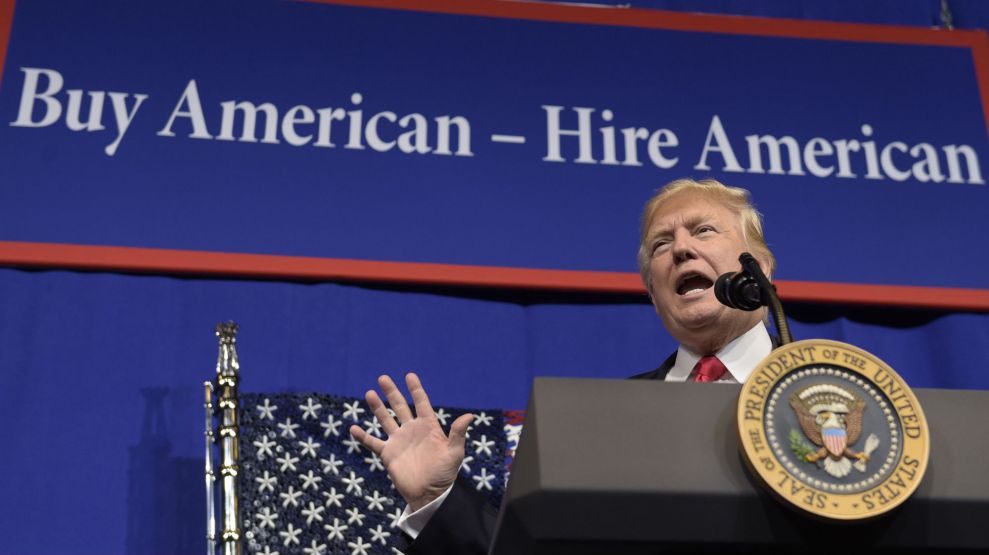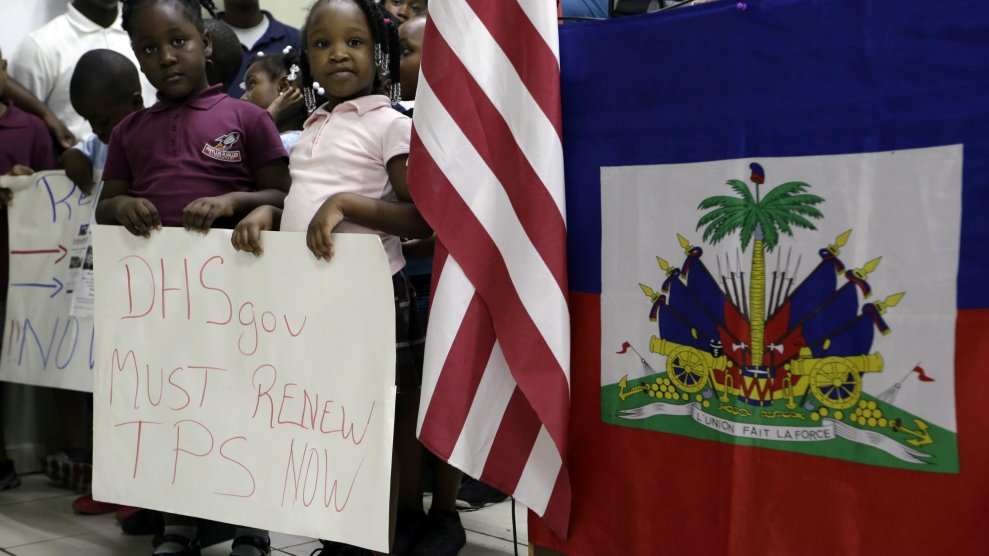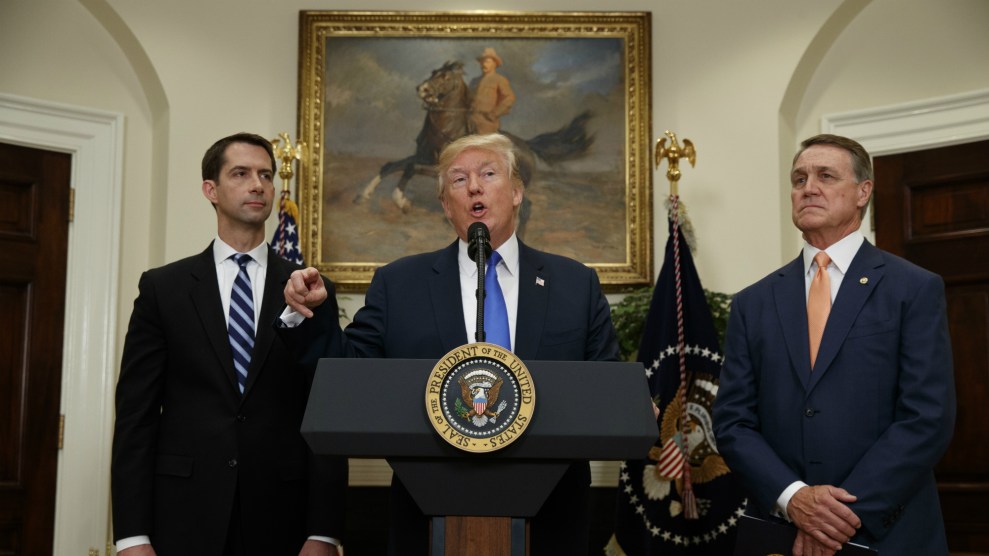
President TrumpSusan Walsh/AP
The Trump White House has devoted much of its first year to putting America first, cracking down on who can come into this country—from promising a wall along the US-Mexico border and the deportation of thousands of undocumented immigrants, to numerous attempts at a travel ban blocking entrance for people from several Muslim-majority countries. But under the America First banner, the administration has been quietly but vastly increasing hurdles in another area: for foreign nationals looking to live and work legally in the US.
Since the spring, the Trump administration has introduced a number of administrative changes aimed specifically at increasing scrutiny on work visa applications. Issued through policy memoranda from United States Citizenship and Immigration Services (USCIS), the agency tasked with handling and adjudicating work and citizenship applications, the revisions have largely flown under the radar, as many of them have been incremental or seem innocuous on the surface. What’s more, because a large number of the changes are adjustments to existing department policies or guidance, many have been able to go into effect immediately, without needing to undergo a formal rule proposal process or public comment period.
Much of the movement is a result of two executive orders: a highly contentious one in January on national security that created the travel ban and also specifically called for increased visa screening and vetting processes, and another in April, called the Buy American, Hire American Executive Order, which called for agencies to create new policies or supersede old ones to hire American workers whenever possible and to “protect the interests of United States workers.”
USCIS spokesperson Arwen Fitzgerald writes in an email to Mother Jones that the agency is “considering a number of policy and regulatory changes to carry out the President’s Buy American, Hire American Executive Order, including a thorough review of employment based visa programs.” She adds, “USCIS is focused on ensuring the integrity of the immigration system and protecting the interests of U.S. workers, and is committed to reforming employment based immigration programs so they benefit the American people to the greatest extent possible.”
But pro-immigration advocacy groups argue that not only do the changes make it harder for foreign nationals to get work visas, but they create an atmosphere of anxiety and uncertainty that discourages workers—and the companies sponsoring them—from applying at all. Though perhaps that’s the point. This April, applications for the H-1B work visa decreased for the first time in years, dropping to under 199,000, compared to 236,000 last year, according to Bloomberg News. Immigrant entrepreneurs are becoming increasingly uneasy about their prospects of staying in the US, and Canada has already begun pitching itself as a friendly alternative for startups. Immigration proponents argue that this toxic climate could soon lead to the US losing out on talented workers and the country falling behind on innovation.
“There’s definitely been a dramatic shift in the business-immigration landscape since the Trump administration took office in January and particularly since the [Buy American, Hire American] executive order,” says Diane Rish, associate director of government relations at the American Immigration Lawyers Association (AILA). Employment applications are being challenged at a much higher rate, and there has been a “constant slew of policy changes that have been difficult to keep up with.”
“It’s certainly the most unfriendly climate that we’ve seen in decades, if perhaps ever, in the modern immigration system,” says Jacob Cherry, an immigration attorney based in Georgia.
Mother Jones reached out to a several immigration attorneys across the country to better understand some of the most significant changes in the shifting landscape. Here’s what we found.
H-1B applications are facing increased scrutiny
The H-1B visa, which is geared toward highly-skilled workers, is one of the few visas available to foreign nationals who want to work for a company in the US and thus are in the most demand. Employers must apply on behalf of the foreign national and prove both that the person will be working in an occupation requiring specialized knowledge and that they possess the skills and qualifications necessary to do so. Only 85,000 visas are available each year, and so many applications are received each year that the visas are ultimately decided by a lottery. The program, though, has been a political target for years, having been criticized for its extensive use by technology outsourcing firms, which tend to pay lower wages compared to other companies. According to a New York Times analysis, 13 outsourcing firms obtained nearly a third of all H-1B visas in 2014. Both Democratic and Republican lawyers have long called for an overhaul of the program, arguing that it displaces American workers.
It’s perhaps no surprise then that the Buy American, Hire American executive order singled out H-1Bs for review, advising top administration officials to suggest reforms ensuring that the visas are “awarded to the most-skilled or highest-paid petition beneficiaries.” In late May, a day before H-1B petitions were due, USCIS rescinded an earlier memo that classified computer programmers as a specialty occupation—a move likely to affect a large share of employers applying for the highly coveted visa. Employers applied for more than 13,000 computer programmer positions last year, according to Bloomberg, and about half of all H-1B applications last year were for computer-related positions.
Immigration lawyers tell Mother Jones that one of the most notable changes they’ve seen in the application process is a drastic increase in Requests for Evidence, or RFEs. USCIS typically issues RFEs if they believe an employer doesn’t meet the requirements for the visa. This year, the agency issued 85,000 RFEs, a 45 percent increase compared to the same period last year, and more than in any year during the Obama administration except for 2009, according to Reuters.
Fitzgerald, the USCIS spokeswoman, says that it’s true USCIS has issued more RFEs, but argues that the the rate “has not markedly increased and in fact has remained consistent over the last few year at around 20 percent,” and that approval rates remain the same. “We understand that RFEs can cause delays, but the added review and additional information gives us the assurance we are approving petitions correctly,” she says.
While an RFE doesn’t necessarily mean an application will be denied, Rish explains, it “generates a lot of concern and anxiety, and it’s very burdensome for the petitioner to gather additional documentation.” The process can be time-consuming and potentially delay a worker’s start date. “US businesses need some predictability on who can be working on a project day-to-day, and not knowing if someone is going to be tied up in an immigration process could discourage employers in the future,” she says.
Sweta Khandelwal, an immigration attorney based in the Bay Area who represents a wide range of employers confirms that she’s seen a major increase in RFEs for her clients. “There’s just so much of a paperwork increase, and the burden of addressing these is so high so that even without passing any legislation you are adversely impacting the H-1B program,” says Khandelwal.
Immigration attorneys tell Mother Jones that while it’s too early for larger companies to change their long-term hiring strategies, the impact will be most immediately felt by smaller companies and startups, and, most of all, by employees already working in the US and hoping to stay. For smaller companies especially, says Khandelwal, “if the visa doesn’t work, then they have no option but to let that person go,” even if the person has already established connections within the US and the company wants to hire them.
“It puts so many more things up in the air,” says one H-1B applicant who spoke to Mother Jones anonymously and is currently waiting on a decision after receiving an RFE this fall. He says he knows other applicants who fear encountering visa application issues and have delayed travel plans outside of the US as a result: “It’s a lot harder to plan your career path, and pursue opportunities that would otherwise have been available to you because of your visa restrictions.”
Green cards now require in-person interviews
In late August, USCIS announced that certain foreigners applying for permanent residence in the US, or green cards, would be required to do in-person interviews as a final step in the application process. Previously, USCIS did not require in-person interviews for people applying from certain visa categories, though it has always had the discretion to request interviews on a case-by-case basis.
USCIS stated that the change complied with the January executive order aimed at increasing national security, and that it was “part of the agency’s comprehensive strategy to further improve the detection and prevention of fraud and further enhance the integrity of the immigration system.” Starting Oct. 1, USCIS said it would begin phasing in interviews for foreigners applying for permanent residence through their employment, as well as for refugees and those with asylum status hoping to bring in relatives. The agency is also “planning an incremental expansion of interviews” to other categories, it says.
Rish says these changes will create a “substantial backlog” for USCIS field offices, and slow down the process for workers, which can already take months or years to process, depending on the type of application. Though lawyers don’t have to be present for interviews, it’s recommended for them to be present, and applicants, as well as their lawyers, may have to travel to attend. It’s also not uncommon for an applicant to have a lawyer who is based in a different city.
In visa extension requests, prior visa approvals no longer matter
In October, USCIS issued a policy memo stating that it would no longer give deference to prior visa approvals if an applicant was filing for an extension of a work visa. Historically, petitioners who were applying for an extension could rely on USCIS officials taking into account their prior approvals, offering some level of security and reassurance that their application would be approved, especially if no underlying facts had changed.
Now, USCIS is “treating an extension as though it was your initial application and applying the same level of scrutiny,” says Cherry, the Georgia immigration lawyer—a move that would create further uncertainty for workers. “It seems like the administration knows they can’t change laws under the current Congress, so they want to make it as difficult as possible to rely on foreign talent.”
The State Department field manual gets stricter
Though USCIS and the Department of Labor are the main agencies charged with formally deciding whether an applicant should receive a work visa, the State Department also plays a role in issuing visas if foreigners are applying from abroad (or if a foreigner has already obtained an H-1B within the US and needs to return after traveling abroad).
In August, the State Department introduced language from the Buy American, Hire American order into several sections of its Foreign Affairs Manual (FAM)—the guide consular officers refer to when determining whether a foreigner should be allowed admission into the United States. The language reiterated the executive order’s goals to “protect the interests of United States workers…including through the prevention of fraud and abuse,” and instructed officers to keep “this spirit in mind” while adjudicating cases.
Cherry called this addition “curious,” as the State Department FAM already notes that if an H-1B petition has been approved by USCIS, that should be enough evidence for State Department officials to grant an approval. Since consular officers are principally charged with ensuring if someone is admissible to the United States, it shouldn’t be in the purview of the State Department to determine whether someone’s admission is within the economic interest of US workers, Cherry argues. Adding the language of Buy American, Hire American only gives officials more grounds to question applicants and increase the risks of getting a visa denied.
Looking ahead
Though the H-1B program has received more attention than others, immigration attorneys and experts anticipate that other visa categories could soon face the same kind of challenges. In a regulatory blueprint published mid-December—the most formal notice to date of the agency’s regulatory agenda—USCIS has proposed several changes restricting or eliminating certain visa categories, including: no longer allowing the spouses of H-1B holders to apply for work permits; eliminating the International Entrepreneur Rule, which allows certain entrepreneurs to remain in the US based on their investments and potential for business growth; and reforming the Optional Practical Training program, which currently allows foreign students to work in the US for up to three years after graduating from a US college or university.
None of this even takes into consideration legislative action. President Trump has already thrown his support behind the RAISE Act, a proposal that would cut legal immigration by half through an overhaul of permanent employment-based sponsorships and limitations on family sponsorships.*
Ian Wagreich, an immigration attorney based in Chicago, says this has overall created a bleak environment for applicants and their employers. “It’s like death by a 1,000 cuts.”
Correction: An earlier version of this story misstated how the proposal would aim to cut legal immigration in half.
Mother Jones wants to hear from you. Have any of these policy changes affected you? If so, how has your life been affected?
We may share your response with our newsroom and publish a selection of stories which would include your name, age, and location. Your email address will not be published and by providing it, you agree to let us contact you regarding your response. We respect your privacy and will not use your email address for any other purpose.
















